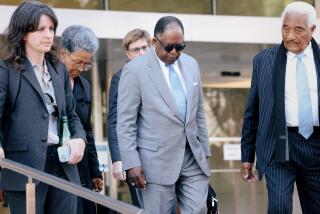Prosecutors seek to dismiss drug charges against Broadcom’s Henry T. Nicholas III
- Share via
Federal prosecutors asked a judge Thursday to dismiss narcotics trafficking charges against Henry T. Nicholas III, wiping out the last criminal charges against the co-founder of Irvine chip maker Broadcom Corp.
The decision came three weeks after a federal judge dismissed charges that Nicholas, Broadcom co-founder Henry Samueli and the company’s former chief financial officer manipulated stock option grants to enrich company employees. U.S. District Judge Cormac J. Carney said prosecutors had intimidated witnesses and made it impossible for the executives to defend themselves.
The judge had scheduled a Feb. 2 hearing to determine whether prosecutors should be allowed to pursue charges that Nicholas supplied Ecstasy and cocaine to friends and business associates. But prosecutors instead opted to drop the drug case, citing issues the judge had raised when he tossed out the options-backdating charges in December.
Prosecutors aren’t ready to give up the options case, however. They filed a notice Thursday that they intend to appeal the dismissals of those charges. The notice did not address the legal grounds for the appeal; a U.S. attorney’s office spokesman said a detailed appeal would be filed at a later date.
Prosecutors did not explain the decision to drop the drug case, saying in the motion that they were acting based on “the court’s findings and rulings in the fraud case.”
Nicholas and his attorney, John Potter, declined to comment. Nicholas had pleaded not guilty, denied any wrongdoing and vowed to prove his innocence at trial. Although Nicholas resigned as Broadcom’s chief executive in 2003, he remains one of the Irvine chip designer’s largest shareholders.
Criminal law experts said the dismissal of the options cases -- and the judge’s findings of prosecutorial misconduct -- hurt prosecutors’ chances in the drug case.
“The drug charges against Nicholas appeared to be designed to pressure him into pleading guilty in the securities fraud case, or to dirty him up in the eyes of a jury,” said Jan L. Handzlik, a former federal prosecutor now defending white-collar cases at Greenberg Traurig in Santa Monica. “So it’s not surprising that they’re being dropped now. The U.S. attorney’s office has exercised its discretion in an appropriate fashion designed both to respond to the comments of the court and to avoid embarrassment.”
Samueli and Nicholas launched Broadcom in 1991 in the garage of Nicholas’ Redondo Beach home, turning it into a technology giant whose chips are used in such products as Apple’s iPhone and Blue- tooth headsets. When the company went public in 1998, Nicholas and Samueli became billionaires and more than 70% of their employees became instant millionaires.
Samueli used his wealth to buy the Anaheim Ducks hockey team and became one of Orange County’s most active philanthropists. Among other things, he helped build engineering schools bearing his name at UCLA -- his alma mater -- and UC Irvine.
Questions about the company’s options practices began to surface in 2006. Options are rights to buy shares of a company’s stock at a specific price, usually the price on the date they are issued. Backdating stock options to a time when the price was lower increases their value. It’s a legal practice as long as it’s accounted for in regulatory filings.
Broadcom was ultimately forced to restate earnings to include $2.2 billion of compensation that had not been disclosed to shareholders. In 2008, Samueli pleaded guilty to lying to SEC regulators about the company’s options practices and agreed to pay a $12-million fine. Nicholas and William J. Ruehle, the former chief financial officer, instead chose to fight the charges.
The most sensational part of the criminal case was the drug charges against Nicholas. A grand jury indictment described the notoriously heavy-handed manager as a fast-living partyer who doled out drugs to prostitutes and business associates.
During a 2001 flight to Las Vegas on a private jet, Nicholas and his entourage generated so much marijuana smoke that it billowed into the cockpit, “requiring the pilot flying the plane to put on an oxygen mask,” the indictment said.
Among other things, the drug indictment accused Nicholas of having supplied some Broadcom customers with prostitutes and narcotics he sometimes referred to as “party favors.” He was also accused of slipping Ecstasy into some customers’ drinks.
But when the case against Ruehle went to trial, it was federal prosecutors who ended up defending themselves. Cormac said he thought prosecutors crossed ethical lines. In one instance, the judge said, a prosecutor contacted the new employer of a former Broadcom worker, causing her to lose her job. She ultimately pleaded guilty and agreed to cooperate with the prosecution.
The judge said such tactics caused him concern about Nicholas’ drug case.
John C. Hueston, a former head prosecutor for the U.S. attorney’s office in Santa Ana, said he was not surprised to see charges dropped in the “side show” drug case against Nicholas, which would have exposed the U.S. attorney’s office to more damage to its reputation and credibility.
“This is probably the most significant case in the past decade for the U.S. attorney in the Central District of California -- for the wrong reason, this national airing of the allegations of prosecutorial misconduct,” he said.
Times staff writer E. Scott Reckard contributed to this report.







